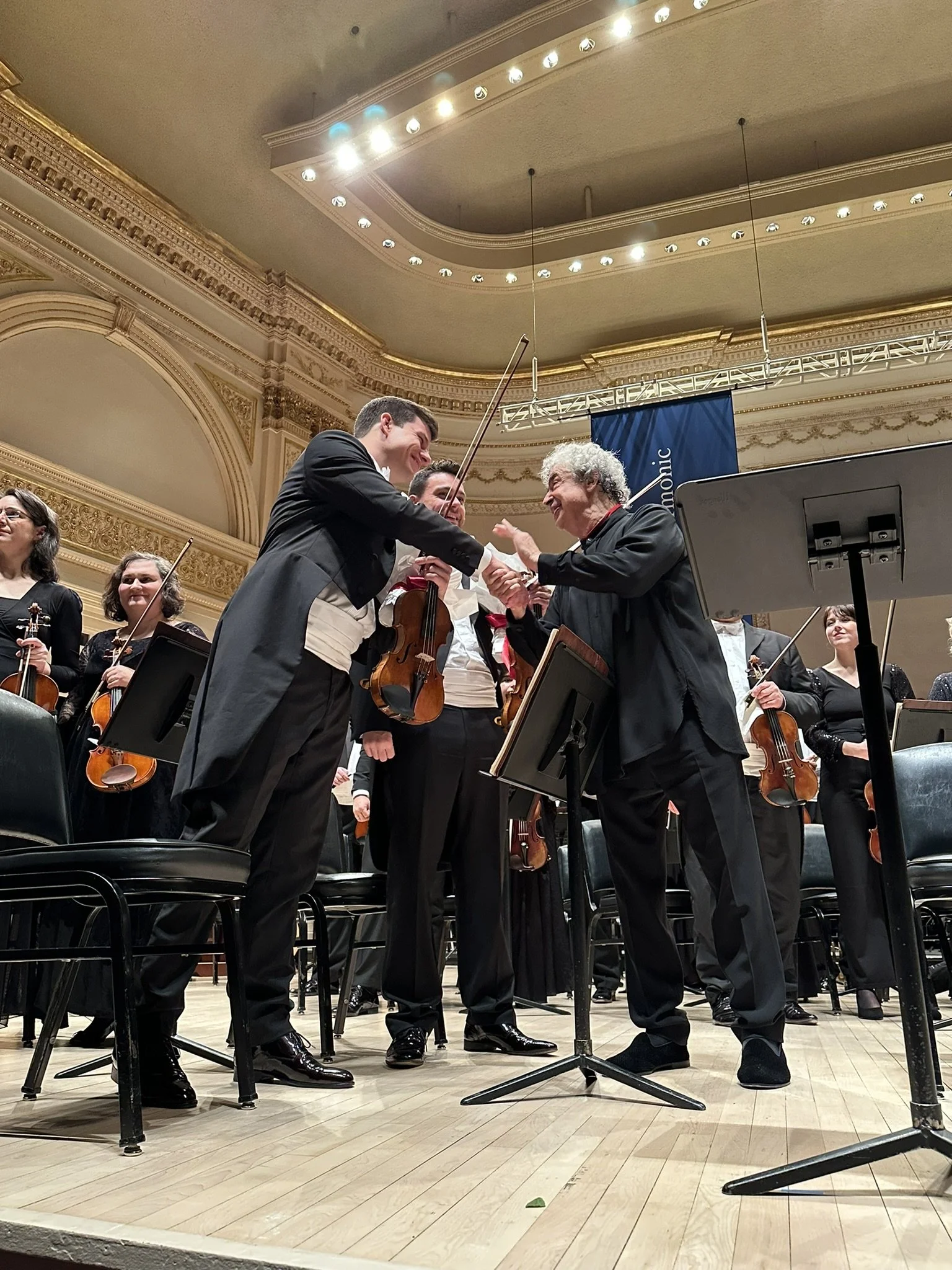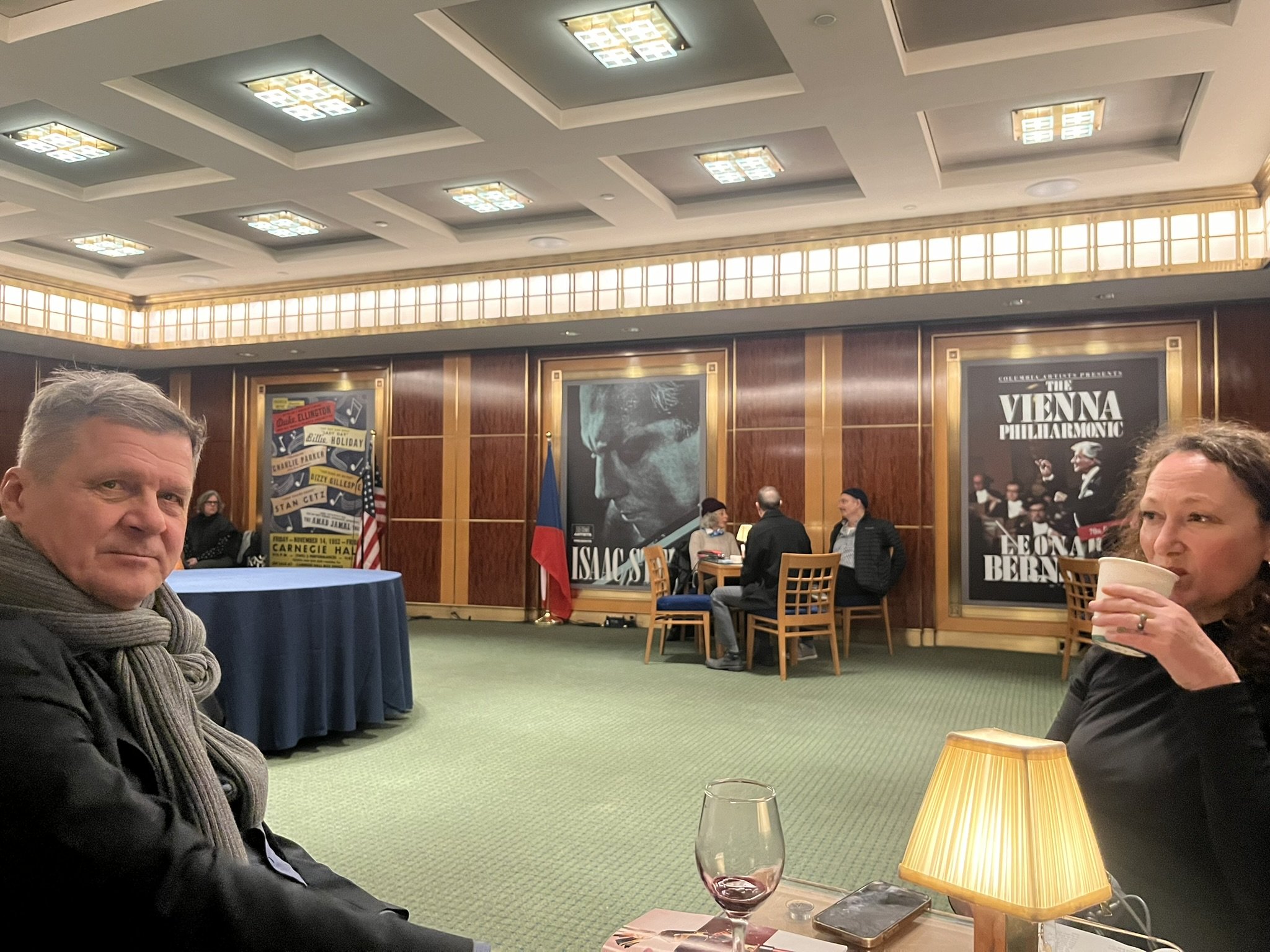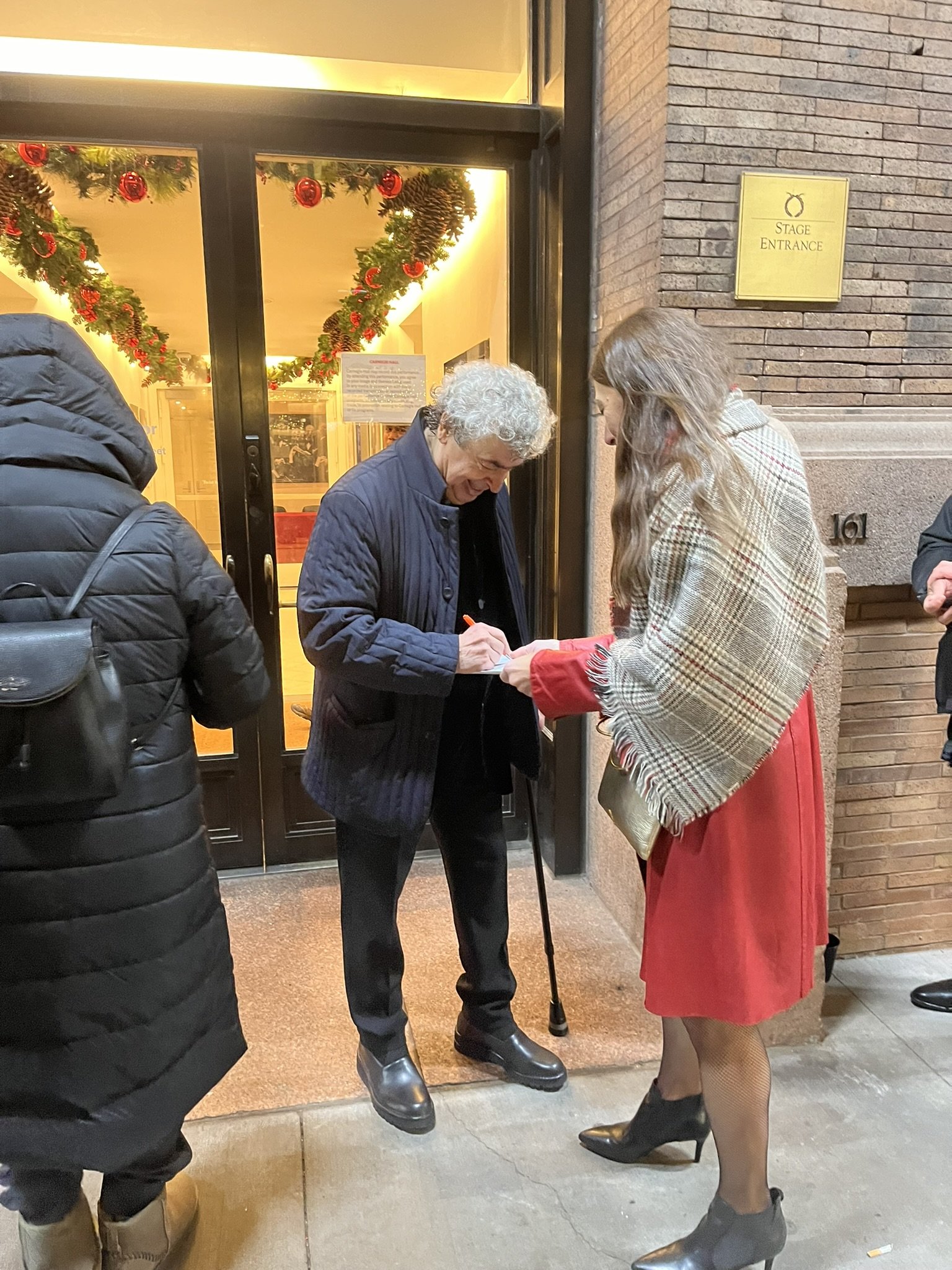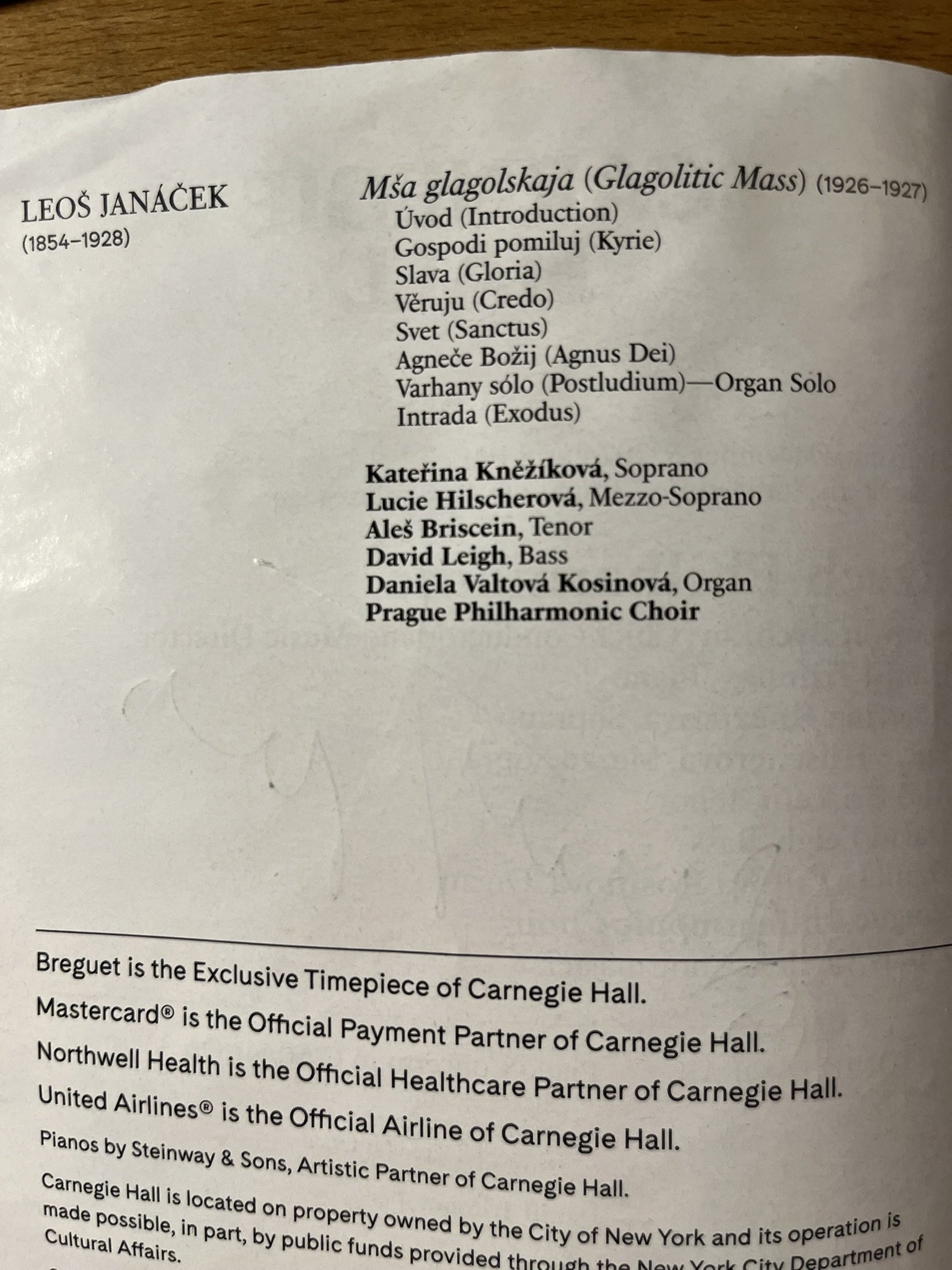For them, Dvořák and Janáček are as natural as Italians eating pasta—timeless recipes preserved across generations without change.
In the Mahler performance the day before, one could sense the musicians’ thoughts, breathing, and individual interpretations. But in this program, the music flowed through them as if it were their very lifeblood: the oboe sang like a bird, the double bass turned like a waterwheel in a stream, and the strings traced the patterns of the wind. You could feel the scent of the time and the land; wheat waiting for harvest glowed golden in the evening sun.
Trifonov is remarkably individualistic, yet even with the Czech Philharmonic performing Dvořák in his naturally Czech style, his personality shone, merged seamlessly with the orchestra, and imbued Carnegie Hall’s whole audience with a sense of wonder.
Janáček’s Glagolitic Mass, sung in the oldest Slavic script, Glagolitic, felt vividly alive. The instruments blended so entirely with the world of the music that one almost forgot it was an orchestra—the chorus, the singers’ words, the songs all intertwined. You could feel the homeland’s yearning for independence, the passion for a lover, and the ambition of Janáček at seventy-three.
Although Janáček, who was non-religious, once said, “Graves beneath the cobblestones, bones on the altars, torture and death in paintings. The church is the essence of death,” the world the orchestra created resonated with the mystery and drama of Berlioz, Brahms, and Verdi. It evoked a pure sense of nature and a love for the Slavic people. The church became a vast forest canopy; the sheep and the bells echoed; the chorus sang the people’s songs, and the soprano’s voice floated like that of an angelic girl. It was as if a Van Gogh painting had been transformed into sound.
2.5.2024
Czech Philharmonic at Carnegie Hall
Semyon Bychkov, Chief Conductor and Music Director
Daniil Trifonov, Piano
Lyubov Petrova, Soprano
Lucie Hilscherová, Mezzo-Soprano
Dmytro Popov, Tenor
David Leigh, Bass
Daniela Valtová Kosinová, Organ
Prague Philharmonic Choir
Lukáš Vasilek, Choirmaster
Program
DVOŘÁK Piano Concerto
JANÁČEK Glagolitic Mass
彼らにとってドボルジャークやヤナーチェクはイタリア人がパスタを食べるように自然だ。彼らはそのレシピを変えず世代を超え守ってきた。一日前のマーラーでは楽員たちの意識や考え、息遣いが伝わってきて、それぞれの歌い方の違いも楽しめたが、このプログラムは彼らの血で演奏され、オーボエは鳥のように鳴き、コントラバスは小川に回る水車の様で弦楽器は風の模様だった。その時と土地の匂いがする。収穫を待つ小麦が夕日に照らされて黄金に輝く。トリフォノフは相当個性的だが、チェコフィルの天然ドボルジャークでも彼の個性は同じく輝き、溶け合い、満席のカーネギーの聴衆を特別な気持ちにさせてくれた。ヤナーチェクのグレゴルミサはスラブ人最古の言葉、グラゴル語で歌われ生々しかった。オーケストラの音色かどうか忘れてしまうほど、楽器がその世界と溶け合って、合唱、歌手たちの言葉、歌。祖国の独立と恋人への情熱、73歳のヤナーチェクの野心を感じる。ヤナーチェクは無宗教で、「敷石の下の墓、祭壇の上の骨、絵画の中の拷問と死。教会は死の本質。」と言っていたそうだが、オーケストラが繰り広げる世界はベルリオーズ、ブラームス、ベルディにつながる神秘とドラマで、純粋な自然とスラブ民族愛を感じた。教会は巨大な森の天蓋、羊の群れや鐘の響き、合唱は民衆の歌、ソプラノは天使のような少女の声。まるでゴッホの絵が音になったようだ。
They brought the entire choir to New York, where the Czech Music Festival was held at Carnegie Hall, featuring a performance of Janáček’s Glagolitic Mass.
合唱も全員連れてきて、チェコ音楽祭がニューヨークのカーネギーホールで開催されて、ヤナーチェクのグレゴルミサを公演した。
Patrons of the Czech Philharmonic from Prague apparently came all the way for this performance. He said he couldn’t understand what the Glagolitic Mass was saying, since it’s written in Glagolitic. However, his friend from Ukraine understood everything. It makes you wonder—are they human, or some extraterrestrial?
プラハでチェコフィルの会員さん。このためわざわざ来たらしいが、グラゴル語で書かれミサは何を言っているかわからないといっていたが、ウクライナの友人は全てわかったそうだ。何人というより、宇宙人なのかどうか。
This was also a Czech attendee. We got Bychkov’s autograph and saw him off together. We look forward to the maestro’s swift recovery and continued success. And we hope to see Janáček’s opera performed at the Met.
こちらもチェコの方で、ビシュコフのサインをいただき、みんなでみおくった。マエストロの一日も早い回復と益々の活躍が楽しみだ。ヤナーチェクのオペラをメットでお願いします。
まったかいあった。ビシュコフのオートグラフ。この筆跡から彼の人柄や音楽性を感じる。
by classicasobi






